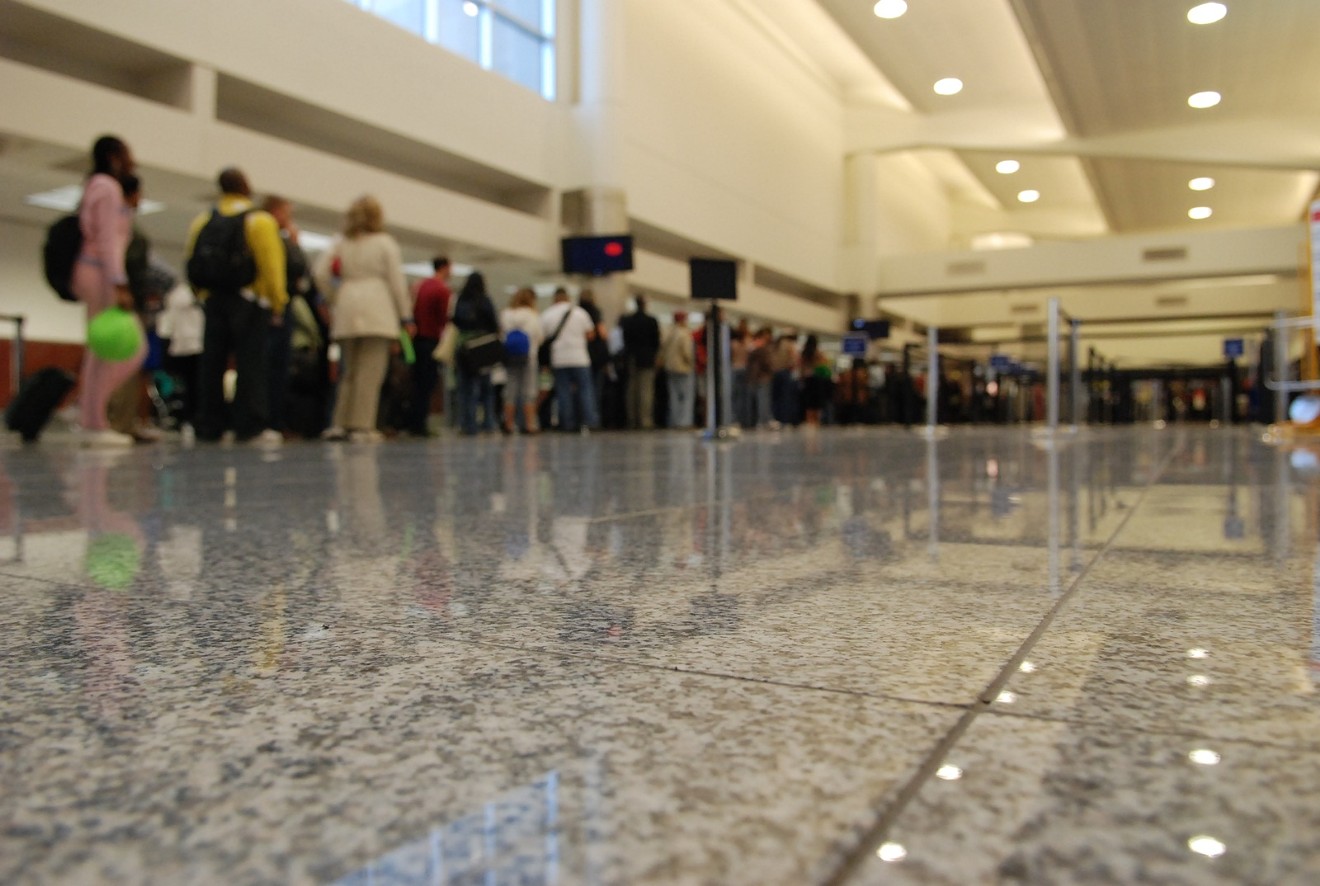Starting today, flyers at Love Field have the option of skipping to the front of the airport's security lines, bypassing fellow travelers and the TSA agents responsible for making sure passengers' identification is valid and matches their boarding passes. All those who want the privilege of being first in line have to turn over is $179 for a yearly membership, all 10 of their fingerprints, two iris scans and a face scan.
"We have a dedicated lane at the checkpoint, and once you enroll in Clear, you can use our dedicated lane," says David Cohen, the chief administrative officer for Clear. "Rather than having to show your travel document, your boarding pass on your phone or a piece of paper to the TSA officer, you're going to use our technology, our biometric technology to verify your travel document and verify your identity in less than half a second."
Customers wising to enroll in the program can begin the process online or at an airport kiosk, but a visit to the kiosk is required to complete enrollment. At the kiosk, potential users have their fingerprints taken, their irises scanned and their faces mapped, before answering a series of challenge questions based on commercially available data to confirm their identities. A Clear member can add a family member to the membership for $50 a year. Children younger than 18 can be added for free.
Once flyers are enrolled, they can use their biometrics to gain access to a special line at security that bypasses the first counter where passengers usually pause. The service complements but doesn't require TSA PreCheck, which allows customers who've passed a security screening to leave their laptops in their bags and their shoes on as they go through airport metal detectors. Cohen says Clear can save travelers about 30 minutes on a flying experience, depending on the airport.
Jeramie Scott, the national security counsel for the Electronic Privacy Information Center, says that despite the potential convenience and time savings he doesn't believe anyone should join Clear because of the amount of personal data one has to turn over to join.
"Part of the issue, if you look at their policy, they possibly disseminate [customers' biometric information] to third parties as well as the government; you don't have any control over it," Scott says. "Their retention policy is one that allows them to keep it indefinitely."
Clear's privacy policy says Clear "may share biometric data and other personal information we obtain about applicants to and members of the Clear program with service providers we have retained to perform services on our behalf." Additionally, the policy says, the company "may disclose biometric data and other personal information ... to airport authorities, the U.S. Transportation Security Administration and other government agencies" for certain purposes. The privacy policy says the company will use data in "conducting background checks and security threat assessments concerning Clear applicants and members."
Cohen says that Clear does everything it can to protect its customers' data. "Ultimately, the integrity of our customers' data is truly the integrity of the company. We use the best available technology and pour a huge amount of resources into safeguarding that personal information of our customers."
Clear's policy allows customers who quit the service to request that their data be destroyed. That isn't good enough, Scott says.
"They will allow consumers to request the removal of the data, but it doesn't necessarily say that they would remove that data. So you're in a position where you're giving you're biometrics up indefinitely. ... Then you're subject to a data breach down the line, and if your biometrics are used as a security measure, such as to unlock your phone, that becomes a bigger issue."
Clear is available at 30 U.S. airports and sports stadiums, where it can be used to jump to the front of pregame security checks. The company is also partnering on a pilot program with Delta that allows its flyers at Reagan National Airport to board their flights using biometrics rather than boarding passes.
Correction July 24, 10:24 a.m. — This story initial said Clear requires applicants have their retinas scanned by the company. That is incorrect. Potential customers actually submit iris scans to Clear.
[
{
"name": "Air - MediumRectangle - Inline Content - Mobile Display Size",
"component": "18855504",
"insertPoint": "2",
"requiredCountToDisplay": "2"
},{
"name": "Editor Picks",
"component": "17105533",
"insertPoint": "4",
"requiredCountToDisplay": "1"
},{
"name": "Inline Links",
"component": "18349797",
"insertPoint": "8th",
"startingPoint": 8,
"requiredCountToDisplay": "7",
"maxInsertions": 25
},{
"name": "Air - MediumRectangle - Combo - Inline Content",
"component": "17105532",
"insertPoint": "8th",
"startingPoint": 8,
"requiredCountToDisplay": "7",
"maxInsertions": 25
},{
"name": "Inline Links",
"component": "18349797",
"insertPoint": "8th",
"startingPoint": 12,
"requiredCountToDisplay": "11",
"maxInsertions": 25
},{
"name": "Air - Leaderboard Tower - Combo - Inline Content",
"component": "17105535",
"insertPoint": "8th",
"startingPoint": 12,
"requiredCountToDisplay": "11",
"maxInsertions": 25
}
]












